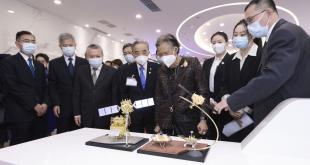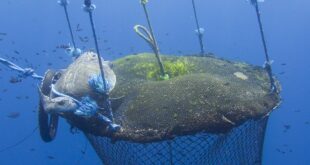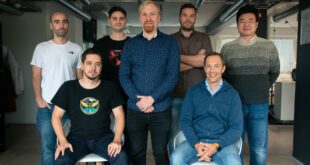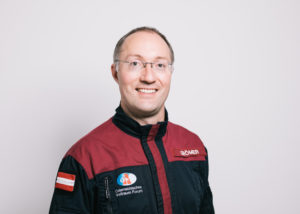
Credits: OeWF (Florian Voggeneder)
SpaceWatch.Global last spoke to Gernot Groemer, Founder and Administrative Director of the Austrian Space Forum (OeWF) last year when we covered the Forum’s work and activities on the Mars Analogue missions. This week, we speak to Groemer as a founding member of the Space Generation Advisory Council (SGAC) which aims to represent the world’s young adults in space policy to the United Nations Office for Outer Space Affairs (UNOOSA) and other international organisations. As the SGAC celebrates its 19th anniversary this year, Groemer speaks to Torsten Kriening about the establishment of the organisation, the unique work it does and his advice to the next generation of space pioneers.
Did you realise at the time of its formation what kind of impact SGAC would have?
When we started the idea of the Space Generation Forum (SGF) at UNISPACE III, we had no idea what would hit us. We were a bunch of rookies from the International Space University just about to become space professionals and we were placed at centre stage of this huge UNISPACE III event, which dates back to the time of the Outer Space Treaty and the conference where the IAC was formed.
We came to this event with a perspective of whatever was discussed, we would be the generation that would be affected by decisions that were made there. The people who were there at the top level were at the end of their career. They would not be around to see the effect of any decisions that were taken, so we thought it very important that representative of the young generation were there and should also be involved in the discussion.
This marvellous magic that we realised nearly two decades ago was not just yet another conference where people discuss something important. There were so many follow-up activities that got significant support from the United Nations. This gave our start-up presence. At the same time, there was immense respect for the ideas of youth and this was something we had not really expected and became the driving force for all the enthusiasm that was generated back then. These were emotional weeks. People were crying and shouting. They were lacking sleep and working like maniacs to get stuff done. But the outcome was incredibly impressive.
Looking back though, you weren’t part of the ‘Apollo generation’. You did not have that moment. Space was not as sexy as it is today. So, why space?
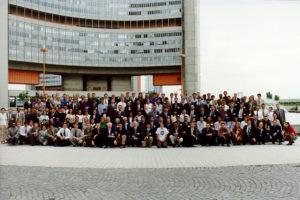
I think the main difference we had back then was that, although there was not that much going on, we didn’t see that as a negative as we were thinking about what could happen. We could be the ones to feel the very first effects of where trends in space were going. We were talking about things like bringing space into the school curriculum and about establishing an organisation involving 4000 people. We saw our events and our activities as bigger things that would have effects over decades. Of course, the magic of young professionals going to the UN, learning about diplomatic dances, how you talk to each other and how you present yourself, was a benefit that we all felt. We were finding out who the moderators and rapporteurs were. It was an amazing experience for us and set us on an excellent career path. Almost 100% of them are now all in middle to higher management because they learned, at a very young age, how to negotiate, how to overcome cultural differences and languages. We learned about the value of the comma and exclamation mark. We had no pre-socialisation into this and that taught us everything. It’s in the DNA of SGAC. I think this is one of the organisation’s key successes. This spirit is palpable.
Let’s fast forward to today. SGAC has about 13,000 members spread all over the world, a new executive director on board and the organisation turns 19 this year. Now you are an adult, and the organisation is an adult, what happens now? You are becoming part of the establishment so how do you keep it fresh and vibrant and turn it over to the next generation?
The history of SGAC is very unique and the spirit of the organisation does date back to that UNISPACE III conference. It enables the youth to gain assertiveness and gives them a say in something that will reflects upon them in 20 years from now. It is a natural catalyst and there needs to be an understanding that this is not just another association of professionals, it is also a strong brand.
If you go to Africa and talk about SGAC to the space agencies, you will find that it is highly respected. This is unprecedented and there’s nothing else comparable with it. It’s not just because of SGAC’s size or geographical spread, but because of this important intertwining with the UN structure. In the future, there needs to be a lot of effort in keeping this intertwining alive because it is like a marriage that you have to work at. The big advantage is that, because we have so many senior people who grew out of SGAC, they have an invisible support network in the background that means there are many more supporters of SGAC to strengthen it – and that’s a unique position.
So is this enough to make SGAC successful in the future? Space is sexy again with a new wave of events just about every week in the space industry. Is it enough to attract the next generation?
No. This is a unique infrastructure but now it needs a vision to create a spark and to define where we go in the next 20 years. There are five year plans that lay out what the near to mid-term areas of focus will and that’s one part of the puzzle. However, if I have one recommendation to make from my perspective, it will be that SGAC needs to be the inconvenient voice in the wilderness. Be brave. Stand up and speak. People appreciate and accept that young people might have very important things to articulate even though they might not be specialists in their field as yet. SGAC needs to be bold and state that this will be the generation that has to live through the decisions that are being taken right now. SGAC is such a strong organisation, it is eligible to stand up and make their voice heard.
Tell us about how your organisation, the Austrian Space Forum, works with SGAC.
 First of all, there is a strong link between SGAC and the Austrian Space Forum. We have a Memorandum of Understanding through which we have an exchange of interests and we work together. In the first few years of the Austrian Space Forum, we found our first interns and our first contracted staff from SGAC. We plug in as a local national catalyst or incubator where students can gain experience and evolve. SGAC gives young people the opportunity to gain hands-on experience and this is unique. I’m not aware of anything else that is comparable to that.
First of all, there is a strong link between SGAC and the Austrian Space Forum. We have a Memorandum of Understanding through which we have an exchange of interests and we work together. In the first few years of the Austrian Space Forum, we found our first interns and our first contracted staff from SGAC. We plug in as a local national catalyst or incubator where students can gain experience and evolve. SGAC gives young people the opportunity to gain hands-on experience and this is unique. I’m not aware of anything else that is comparable to that.
What is your advice for the next generation?
First of all, learn about what has been done before. Don’t reinvent the wheel. Read reports, talk to people. Second, learn your tools. How can you implement ideas and how does the system work? And the third is to recognise that you are privileged to be visionary. Naivety is the privilege of youth. It’s something that we have lost, as we are too senior. Be unconventional. Stand up and speak with your own voice because you will be the ones who are suffering or benefitting from the decisions being taken right now.
CALLING ALL POTENTIAL ANALOGUE ASTRONAUTS!

The Austrian Space Forum is seeking six volunteers to complete its international analog astronaut corps. Citizens of the European Union, Liechtenstein and Switzerland, who are between 25 and 45 years old and have a background in science or engineering, can submit their application up until the 10th of October 2018.
Successful candidates will undergo an extensive training using the Austrian Space Forum’s spacesuit prototype. Two of the newly selected analog astronauts will participate in the next Mars analog mission to take place in 2020 involving international institutions from science, industry and academia. The Austrian Space Forum’s analog astronauts will also act as ambassadors of science, technology and engineering, interact with the public and media and have access to a wide network of spaceflight experts, industry and politics.
Have you got what it takes? Find out more at https://oewf.org/wp-signup.php?new=class2019


